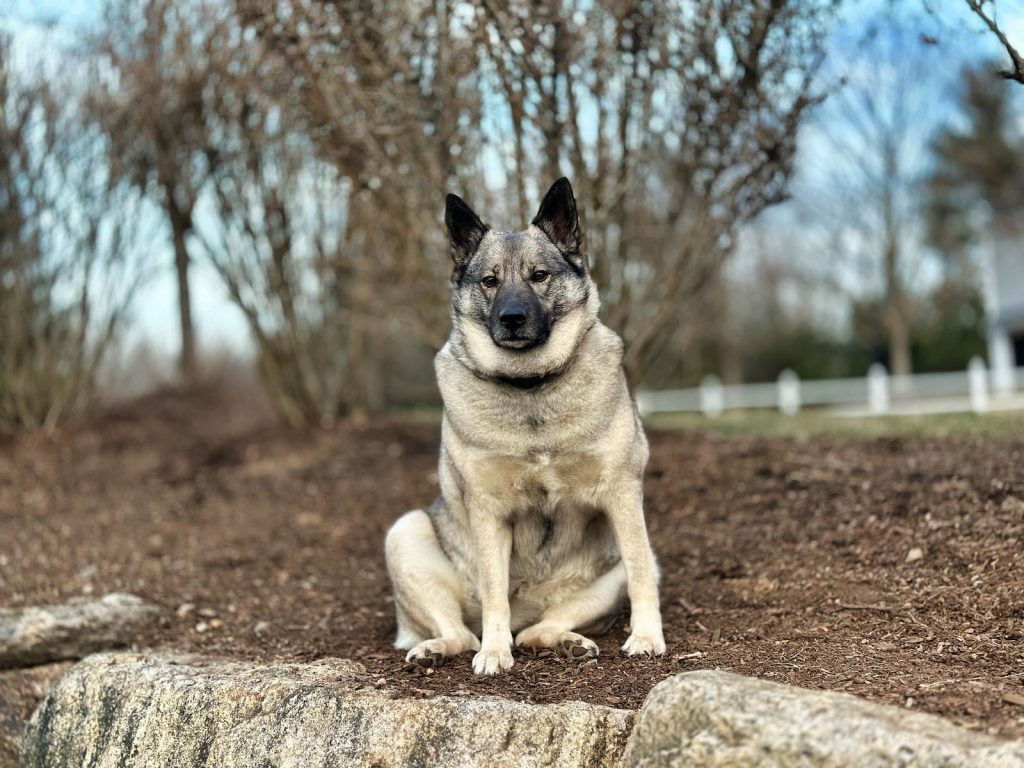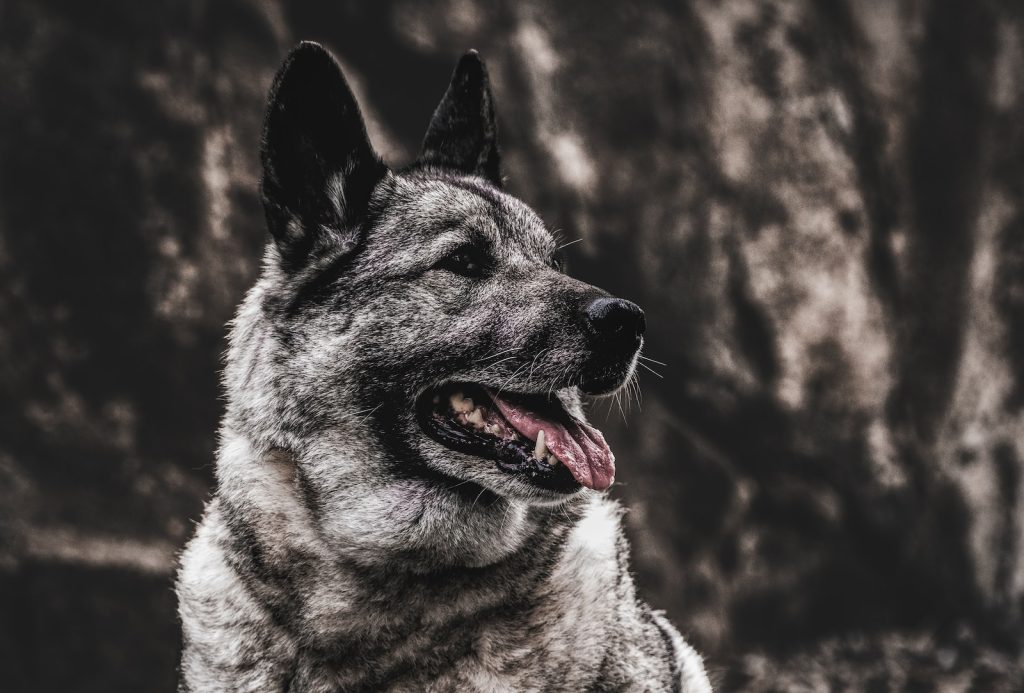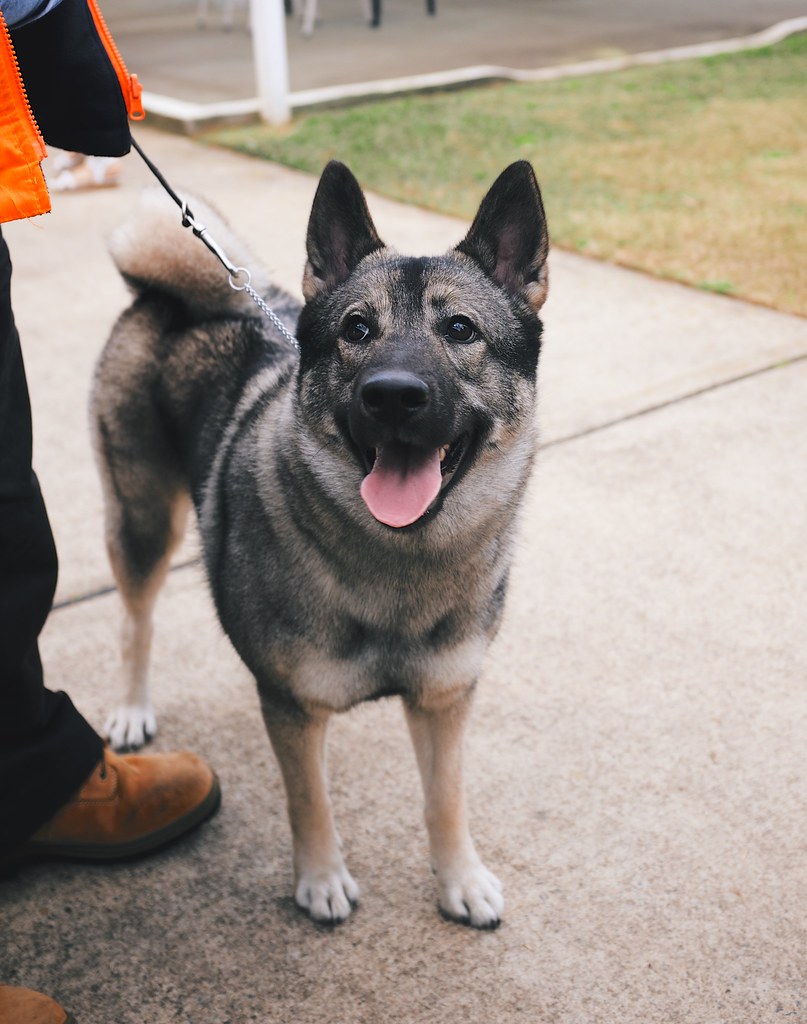If you’re searching for a four-legged friend that embodies loyalty, intelligence, and adaptability, look no further than the Norwegian Elkhound. This remarkable breed, also known as the Norsk Elghund, has a rich history and a set of unique characteristics that make it a beloved companion for active families around the world. This comprehensive article will delve into the past, temperament, grooming needs, training requirements, health considerations, living space considerations, socialization, and caring for a Norwegian Elkhound. By the end, you’ll understand whether this breed is the perfect fit for you and your family.
Key Takeaways
- Norwegian Elkhounds are hardy and agile dogs originally bred for hunting and tracking.
- They have a powerful build, thick coats, and curled tails, making them suited for cold climates and outdoor activities.
- Training Norwegian Elkhounds requires consistent and firm but gentle techniques, as they can sometimes be stubborn.
- Regular grooming sessions, balanced nutrition, and regular exercise routines are essential for the health and well-being of Norwegian Elkhounds.

Norwegian Elkhound: A Versatile and Intelligent Breed
The History and Origin of Norwegian Elkhound
The Norwegian Elkhound’s lineage can be traced back over a thousand years. This ancient breed has been a steadfast companion to the Norwegian people since ancient times, primarily serving as a hunting dog for big game, such as moose, bear, and wolves. The breed’s roots are deeply intertwined with Norse mythology, and its ancestors can be seen in Viking-era artwork and sagas. Known for their incredible stamina and tracking abilities, Norwegian Elkhounds were highly valued for their hunting, guarding, and even herding skills.
The Influence of Vikings on the Norwegian Elkhound Breed
During the Viking Age, the Norwegian Elkhound gained widespread recognition and admiration due to its invaluable contributions to Norse society. Vikings held the breed in high regard, relying on their keen senses and fierce loyalty during their legendary expeditions. These dogs accompanied Vikings on long voyages, protected their settlements, and provided companionship in the harshest conditions. The breed’s strength, resilience, and unwavering dedication earned it a place of honor in Norse culture.
Recognition as a Breed and Spread to Other Parts of the World
The Norwegian Elkhound was formally recognized as a distinct breed in the late 19th century. The Norwegian Kennel Club was crucial in preserving and promoting the breed’s characteristics, ensuring its continued existence. Over time, Norwegian Elkhounds gained popularity beyond their native land, captivating dog enthusiasts worldwide with their striking appearance and versatile abilities. Today, they are cherished companions and accomplished show dogs, demonstrating their enduring appeal.
Distinctive Characteristics and Temperament
This breed possesses several distinctive characteristics that set it apart from other breeds. Let’s take a closer look at its physical attributes and temperament.
Physical Appearance and Size
This breed is a medium-sized dog with a well-balanced and compact build. They boast a sturdy frame and a confident, upright posture. Their eyes are dark and expressive, exuding intelligence and alertness. The breed’s thick double coat, comprised of a coarse outer layer and a dense undercoat, provides excellent protection against harsh weather conditions. Their tails are tightly curled over their backs, enhancing their majestic appearance.
| Physical Characteristics | Details |
|---|---|
| Size | Medium-sized |
| Height | Males: 19.5-20.5 inches; Females: 18-19 inches |
| Weight | Males: 55-60 pounds; Females: 48-55 pounds |
| Coat | Thick, weather-resistant double coat |
| Color | Gray with black-tipped guard hairs |
| Lifespan | 12-15 years |
Temperament and Personality Traits
Norwegian Elkhounds are renowned for their loyalty, independence, and intelligence. They form strong bonds with their families, make excellent watchdogs, and are always alert to potential intruders. While their independent nature can sometimes result in a stubborn streak, consistent and patient training can overcome this tendency.
These dogs are inherently social creatures and thrive on human companionship. They enjoy participating in family activities and are especially fond of children, making them an ideal choice for families with kids. However, early socialization and proper introductions are essential to ensure they develop good manners and behave appropriately around other animals and strangers.
The Norwegian Elkhound’s instinct as a hunting dog may lead to chasing small animals, so caution should be exercised when introducing them to cats or other small pets. With proper training and socialization, they can coexist peacefully with other animals in the household.
Grooming Needs
The Norwegian Elkhound’s thick double coat requires regular grooming to maintain its health and appearance. Let’s explore their grooming needs in detail.
Coat Care and Shedding
Their dense, weather-resistant coat makes Norwegian Elkhounds well-suited to colder climates. However, their abundant coat does require regular maintenance. Weekly brushing sessions are essential to remove loose hair, prevent matting, and promote healthy skin and coat. During shedding seasons, typically occurring twice a year, more frequent brushing may be necessary to manage the increased hair loss.
While not considered hypoallergenic, Norwegian Elkhounds do not produce as much dander as other breeds. This can make them a viable option for individuals with mild allergies. Regular grooming and keeping a clean living environment might aid in the reduction of allergens.
Bathing and Hygiene
Norwegian Elkhounds have a self-cleaning coat that repels dirt, making them low-maintenance when bathing. To keep their coat clean and healthy, they should be washed regularly with a moderate dog shampoo. Overbathing should be avoided because it can deplete their coat of natural oils, causing dryness and skin irritation.
Proper dental care is vital for avoiding dental problems, including gum disease and poor breath. Regular tooth brushing and dental chews can aid in maintaining oral health.
Training Needs
Norwegian Elkhounds are intelligent and eager to please, making them trainable dogs. However, their independent nature can pose challenges, requiring consistent and patient training. Here are some important considerations when it comes to training a Norwegian Elkhound.
Start Early and Be Consistent
Begin training your Norwegian Elkhound as early as possible. Puppies are highly receptive to learning and can quickly grasp basic commands and house rules. Establishing clear boundaries and consistent routines will help shape their behavior and prevent unwanted habits from developing.
This breed responds best to positive reinforcement strategies such as praise, treats, and playtime. Harsh or punitive training methods can be counterproductive, as Norwegian Elkhounds respond better to gentle guidance and motivation.
Socialization for a Well-Adjusted Companion
Socialization is crucial for Norwegian Elkhounds to become well-rounded and confident adults. Expose them to various people, animals, and environments from an early age. This exposure helps them become comfortable in different situations and reduces the likelihood of anxiety or aggression later in life.
Enrolling your Norwegian Elkhound in puppy socialization classes and obedience training can be highly beneficial. These classes allow them to interact with other dogs and learn essential commands in a controlled environment.

Health Considerations
Norwegian Elkhounds are typically healthy dogs; however, like all breeds, they are prone to some health issues. Responsible breeding practices and regular veterinary care are essential to maintain their well-being. Here are some common health considerations for Norwegian Elkhounds:
Hip Dysplasia
Hip dysplasia is a hereditary disorder affecting the hip joints. In severe circumstances, it can cause pain, lameness, and arthritis. Responsible breeders conduct hip evaluations on their breeding stock to minimize the occurrence of this condition. Regular exercise, a healthy diet, and maintaining an appropriate weight can also help reduce the risk of hip dysplasia.
Progressive Retinal Atrophy (PRA)
PRA is a degenerative eye illness that can result in blindness. Regular eye examinations by a veterinary ophthalmologist can help detect this condition early on. Responsible breeders ensure that their breeding dogs are free from PRA to reduce the risk of passing it on to offspring.
Other Health Concerns
While relatively rare, Norwegian Elkhounds may be susceptible to certain conditions, including hypothyroidism, renal dysplasia, and pyotraumatic dermatitis (hot spots). Regular check-ups with a veterinarian, a balanced diet, and an active lifestyle can improve their overall health and well-being.
Living Space Considerations
Norwegian Elkhounds are adaptable to different living environments but thrive in homes with access to a securely fenced yard. Their innate hunting instincts make them prone to wander, so a well-enclosed outdoor space is necessary to prevent them from chasing after scents or wildlife.
They are not well-suited to apartment living, as they require ample exercise and mental stimulation to stay content and avoid becoming bored or destructive. Daily walks, interactive play sessions, and challenging toys are essential for meeting their exercise needs.
Socialization: Building Strong Bonds and Manners
Socialization plays a vital role in shaping a Norwegian Elkhound’s behavior and ensuring they develop into well-mannered and friendly companions. Early and continued socialization is essential to fostering positive interactions with people and other animals. Here are some tips for successful socialization:
- Expose them to various environments: Introduce your Norwegian Elkhound to different settings, such as parks, busy streets, and other homes. This exposure helps them become comfortable and confident in new situations.
- Introduce them to different people: Expose your dog to a diverse range of individuals, including men, women, children, and individuals wearing hats or uniforms. This exposure will help them become more accepting of different people and reduce the likelihood of fear or aggression.
- Positive experiences with other animals: Allow your Norwegian Elkhound to interact with well-behaved dogs and pets in a controlled setting. Gradual introductions and positive experiences can help foster positive relationships and prevent aggression.
Caring for Your Norwegian Elkhound
Caring for a Norwegian Elkhound involves providing proper nutrition, regular exercise, grooming, and preventive healthcare measures. Let’s explore these aspects in more detail.
Nutrition and Feeding
A nutritious and balanced food is crucial for your Norwegian Elkhound’s general health and well-being. High-quality dog food formulated for medium-sized breeds is recommended. Feeding guidelines provided by the manufacturer should be followed, but adjustments may be necessary based on your dog’s age, activity level, and metabolism.
Divide their daily food into two meals to prevent bloating and digestive issues. Always ensure access to fresh, clean water.
Exercise and Mental Stimulation
Norwegian Elkhounds are an active breed that thrives on physical exercise and mental stimulation. They require daily walks, play sessions, and engaging activities to channel their energy and prevent boredom.
Consider incorporating activities such as hiking, jogging, or participating in dog sports like agility or obedience trials. Mental stimulation, such as puzzle toys and training sessions, can help keep their minds active and prevent behavioral disorders.
Veterinary Care and Preventive Measures
Regular veterinary check-ups are crucial for monitoring your Norwegian Elkhound’s health and detecting potential issues early on. Vaccinations, parasite prevention (fleas, ticks, and heartworms), and dental care are essential to preventive healthcare.
Spaying or neutering is recommended unless you have plans to breed your dog responsibly. This helps control the pet population, offers health benefits, and reduces certain behavioral tendencies.
Adopting a Norwegian Elkhound
Adopting a Norwegian Elkhound can be a rewarding experience. If you’re considering adding one of these beautiful dogs to your family, explore these adoption options:
- Rescue Organizations: Contact local or breed-specific rescues specializing in Norwegian Elkhounds. These organizations often have dogs of various ages available for adoption. Adoption fees usually cover initial veterinary care, spaying/neutering, and sometimes basic training.
- Breeders: If you choose to work with a breeder, it’s crucial to find a reputable one who prioritizes the health and well-being of their dogs. Ask for references, visit their facilities, and ensure they conduct health screenings on their breeding stock. Responsible breeders are committed to producing healthy puppies and are a valuable source of information and support.

FAQs about Norwegian Elkhounds
Is a Norwegian Elkhound a good family dog?
Yes, Norwegian Elkhounds make excellent family dogs. They are loyal, affectionate, and have a natural affinity for children. They can form strong bonds with all family members, including children, with proper socialization and training.
Is Norwegian Elkhound a husky?
No, they are not husky. While they share some physical similarities, such as their double coat and spitz-like appearance, they are distinct breeds with different origins and characteristics.
Will a Norwegian Elkhound protect you?
Norwegian Elkhounds have protective instincts and will alert their owners to potential threats or intruders. However, they are not typically aggressive dogs and are likelier to bark and intimidate than engage in a physical confrontation. Early socialization and training help ensure they exhibit appropriate protective behavior.
Is a Norwegian Elkhound a wolf hybrid?
No, this breed is not wolf hybrid. They are a purebred dog breed with no wolf ancestry. Their impressive appearance may resemble a wolf’s, but they are domesticated dogs with distinct characteristics and traits.
Are Norwegian Elkhounds good with children?
Yes, they are generally good with children. They are patient and playful, making them suitable companions for kids. However, supervision and teaching children how to interact respectfully with dogs are crucial to ensure positive interactions.
Are Norwegian Elkhounds prone to separation anxiety?
Norwegian Elkhounds are social dogs that form strong bonds with their families. While they can tolerate some alone time, excessive periods of isolation may lead to separation anxiety. Providing mental stimulation, sufficient exercise, and gradually acclimating them to alone time can help prevent or minimize separation anxiety.
Conclusion
The Norwegian Elkhound is a remarkable breed with a rich history and versatile capabilities. Their loyalty, intelligence, and adaptability make them cherished companions for active families. From their ancient roots as Viking companions to their modern-day roles as loving family pets, Norwegian Elkhounds continue to captivate dog enthusiasts worldwide. Consider the breed’s distinctive characteristics, grooming needs, training requirements, health considerations, living space requirements, and socialization needs when deciding if the Norwegian Elkhound is the right breed for you. With proper care, training, and socialization, a Norwegian Elkhound can bring years of joy, love, and companionship into your life.
Find Your Perfect Companion Today!
At Bone Voyage Dog Rescue, we are dedicated to making a positive impact by finding loving homes for abandoned and mistreated dogs. Our adoption program focuses on pairing each dog with the most compatible family based on their unique traits. By adopting a dog from us, you’re not only providing them with a new home but also giving them a chance to live a happy life.
Discover the joy of adoption and change a dog’s life forever. Email us now at [email protected] to start the adoption process.
Make a Difference with a Temporary Home!
Fostering a dog is another way to make a significant impact. Provide a safe and loving environment for a dog while they wait to find their forever family. It’s an excellent opportunity to make a difference without a long-term commitment. If you’re interested in fostering, get in touch with us at [email protected].
Become a Part of Something Special!
Volunteers play a vital role in our team, from taking dogs on walks to organizing events. By joining our dedicated group of volunteers, you can make a meaningful difference in the lives of our furry friends. If you’d like to contribute and be a part of our team, contact us at [email protected].
Take the First Step Today!
To learn more about our adoption program or bring home a loving companion, call us at +52 3329718011. We can give these dogs a second chance at a happy life together.
Remember, every action counts! Adopt, foster, volunteer, and make a difference in the lives of these deserving dogs today.
